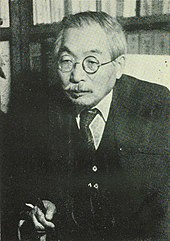Sasaki Sōichi
Sasaki Sōichi ( Japanese 佐 々 木 惣 一 ; born March 28, 1878 in Tottori ( Tottori Prefecture ); died August 4, 1965 ) was a Japanese lawyer.
Live and act
Sasaki Sōichi finished his law studies at the University of Kyoto in 1903 . In 1906 he became an assistant professor at his alma mater. From 1909 he went to Europe for three years, where he studied administrative law in Germany, France and England. On his return he was appointed professor in 1913 and submitted his doctoral thesis in the same year. In 1921 he became dean of the faculty. In 1933 he left the university to protest against encroachments on academic freedom in general and in particular because of the dismissal of his colleague Takikawa Yukitoki. In 1934 Sasaki became President of Ritsumeikan University and in 1939 a member of the Academy of Sciences .
Immediately after the end of the Pacific War in 1945, Sasaki was subsequently named "Meiyo Kyōju" by the University of Kyoto. And he, along with Konoe Fumimaro , who took his own life shortly thereafter, was asked by the Lord Seal Keeper to propose a possible change to the Meiji constitution. Sasaki's proposals for amendments to the constitution and administrative law were characterized by a sharp logic and thorough objectivity.
In 1952 Sasaki was honored as a person with special cultural merits and was awarded the Order of Culture in the same year .
Remarks
- ↑ The law professor Takikawa Yukitoki (滝 川 幸 辰; 1891–1962) was dismissed because of his leftist ideas in the more and more military-determined period from the 30s.
- ↑ Meiyo Kyōju (名誉 教授) is occasionally rendered in German as "Professor emeritus". But in contrast to this title, which is automatically used on retirement, this is a special award only occasionally granted in Japan.
literature
- S. Noma (Ed.): Sasaki Sōichi . In: Japan. An Illustrated Encyclopedia. Kodansha, 1993. ISBN 4-06-205938-X , p. 1319.
| personal data | |
|---|---|
| SURNAME | Sasaki, Sōichi |
| ALTERNATIVE NAMES | 佐 々 木 惣 一 (Japanese) |
| BRIEF DESCRIPTION | Japanese lawyer |
| DATE OF BIRTH | March 28, 1878 |
| PLACE OF BIRTH | Tottori ( Tottori Prefecture ) |
| DATE OF DEATH | 4th August 1965 |
